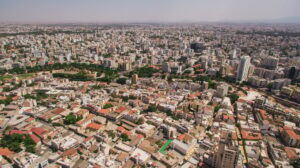Two Capitals, Different Worlds
Nicosia and Lisbon both serve as capitals, but that’s where many similarities end. If you’re considering a move from Cyprus to Portugal, or just curious about how these cities compare, the differences might surprise you.

Nicosia sits inland in the Eastern Mediterranean, divided by history and shaped by its unique position as the world’s last divided capital. Lisbon spreads across seven hills along the Atlantic, united and looking westward toward the Americas. Both cities have charm, but they offer completely different urban experiences.
Size and Scale Differences
Lisbon’s Urban Sprawl Lisbon proper has about 500,000 people, but Greater Lisbon reaches nearly 3 million. Coming from Nicosia, the scale feels overwhelming at first. The city spreads far beyond what you can easily walk, unlike Nicosia where you can cross the entire city center in 30 minutes.

The metro system connects neighborhoods that would be separate towns in Cyprus. Cascais, technically a Lisbon suburb, is 30km away – that’s like living in Limassol and commuting to Nicosia daily.
Nicosia’s Compact Reality Greater Nicosia has roughly 330,000 people, making it feel intimate compared to Lisbon. You probably know people in most neighborhoods. Everyone’s social circles overlap. This creates a community feeling that’s hard to replicate in a larger city.
The downside? Limited options for everything from restaurants to job opportunities. What Nicosia offers in community, it sometimes lacks in variety.
Housing and Neighborhoods
Lisbon Housing Market
Rental Costs: Central Lisbon apartments cost €800-1,500 for one bedroom, €1,200-2,500 for two bedrooms. Prime areas like Chiado or Príncipe Real reach €2,000+ for decent two-bedroom places.
Buying Property: Expect €4,000-8,000 per square meter in desirable neighborhoods. A typical 100sqm apartment in central Lisbon costs €400,000-800,000, though you can find cheaper options in outer neighborhoods.
Popular Neighborhoods for Expats:
- Chiado/Bairro Alto: Historic center, nightlife, expensive
- Santos: Trendy, good restaurants, design district feel
- Cascais: Coastal, family-friendly, 30-minute train to center
- Campo de Ourique: Residential, good value, local feel
Nicosia Housing Reality
Rental Market: Nicosia rentals run €500-1,200 for apartments in good areas. You get more space for your money compared to Lisbon, but fewer neighborhood options.
Property Purchase: Buying costs €1,500-3,500 per square meter in nice areas. A similar 100sqm apartment might cost €150,000-350,000, significantly less than Lisbon.
Neighborhood Character: Nicosia neighborhoods blend together more than Lisbon’s distinct districts. The old town has character, but most residential areas feel similar. You don’t get Lisbon’s variety of neighborhood personalities.
Quality of Life Differences
Space and Privacy: Nicosia apartments typically offer more space for the money. Parking is easier to find. You’re more likely to have a balcony or small garden.
Building Standards: Both cities have older buildings with character and newer developments. Lisbon’s older buildings often lack elevators and parking. Nicosia’s newer developments usually include both.
Transportation Networks
Getting Around Lisbon
Public Transport: Lisbon’s metro, trams, buses, and trains create a comprehensive network. A monthly pass costs around €40 and gets you anywhere in the greater Lisbon area.
The famous Tram 28 is tourist-packed but useful. The metro connects major areas efficiently. Buses fill the gaps, though they can be slow in traffic.
Driving in Lisbon: Parking is expensive and scarce in central areas. Many residents don’t own cars, relying on public transport and occasional rentals or ride-sharing.
Traffic can be heavy, but it’s manageable compared to major European cities. The ring roads help bypass the center.
Getting Around Nicosia
Limited Public Transport: Nicosia’s bus system exists but most residents drive. Routes are limited and schedules can be unreliable. A car feels necessary rather than optional.
Driving Culture: Parking is generally easier and cheaper than Lisbon. Traffic jams happen but nothing like Lisbon’s rush hour. Most destinations are 15-20 minutes by car.
Walkability: The old town is walkable and pleasant. Newer areas were built for cars, making walking between neighborhoods difficult.
Work and Career Opportunities
Lisbon Job Market
Startup Scene: Lisbon has become a major European tech hub. Companies like Unbabel, Farfetch, and international offices create opportunities in technology, marketing, and business development.
International Companies: Many multinational companies have Portuguese operations or European headquarters in Lisbon. This creates jobs for English speakers and international professionals.
Salary Expectations: Entry-level positions: €1,000-1,500 monthly Mid-level professionals: €1,500-3,000 monthly
Senior roles: €3,000-6,000+ monthly
Salaries are lower than Northern Europe but rising, especially in tech.
Freelancing and Remote Work: Lisbon attracts remote workers and digital nomads. Co-working spaces are common, and the city actively promotes itself as a remote work destination.
Nicosia Employment Landscape
Limited Sectors: Jobs concentrate in government, banking, professional services, and tourism. The economy is smaller and more limited than Lisbon’s diverse opportunities.
Salary Levels: Entry-level: €900-1,300 monthly Mid-level: €1,500-2,500 monthly Senior positions: €2,500-4,500+ monthly
Language Requirements: Most professional jobs require Greek or Turkish, limiting opportunities for international workers compared to Lisbon’s English-friendly environment.
Business Environment: Starting a business involves more bureaucracy and limited local market size compared to Lisbon’s access to Portuguese and EU markets.
Cost of Living Breakdown
Daily Expenses Comparison
Groceries:
- Lisbon: €60-80 weekly for one person, quality supermarkets everywhere
- Nicosia: €50-70 weekly, smaller selection but competitive prices
Dining Out:
- Lisbon: Lunch €8-15, dinner €15-30, wide variety of cuisines
- Nicosia: Lunch €6-12, dinner €12-25, mostly Mediterranean options
Utilities:
- Lisbon: €80-120 monthly for electricity, water, internet
- Nicosia: €100-150 monthly, higher cooling costs in summer
Entertainment:
- Lisbon: Cinema €8, drinks €3-6, concerts €20-50
- Nicosia: Cinema €10, drinks €4-7, limited live entertainment
Healthcare Systems
Lisbon Healthcare: Portugal’s national health system (SNS) provides universal coverage. Private healthcare is also available and affordable. Many doctors speak English.
Waiting Times: Public system can have delays for non-urgent care. Private insurance (€30-80 monthly) provides faster access.
Nicosia Healthcare: Cyprus has good healthcare with both public and private options. Shorter waiting times due to smaller population, but fewer specialized services.
Cultural Life and Entertainment
Lisbon’s Cultural Scene
Museums and Arts: World-class museums like Museu Nacional de Arte Antiga, Berardo Collection, and numerous galleries. Regular exhibitions and cultural events.
Music and Nightlife: Fado music venues offer authentic Portuguese culture. Bairro Alto and Cais do Sodré provide vibrant nightlife with international crowds.
Festivals: Rock in Rio Lisboa, Web Summit, Lisbon Architecture Triennale, and neighborhood festivals throughout the year.
Nicosia Cultural Offerings
Local Culture: Strong Greek Cypriot cultural traditions, Orthodox festivals, and local arts scene. More intimate and community-focused than Lisbon’s international cultural offerings.
Entertainment Options: Fewer large venues and international acts, but what exists feels more personal and accessible.
Cultural Identity: Stronger connection to local traditions and customs compared to Lisbon’s more cosmopolitan atmosphere.
Climate and Lifestyle
Weather Patterns
Lisbon Climate: Mild, wet winters (10-15°C) and warm, dry summers (25-30°C). Ocean breezes moderate temperatures. Rain is concentrated in winter months.
Outdoor Living: Year-round outdoor café culture. Beach access within 30 minutes. Parks and gardens throughout the city.
Nicosia Climate: Hot, dry summers (30-40°C) and mild winters (5-15°C). More extreme temperatures than Lisbon. Summer heat can be intense.
Seasonal Differences: Summer heat limits outdoor activities during the day. Air conditioning is essential. Winter is mild and pleasant.
Social Life and Community
Making Friends in Lisbon
International Community: Large expat population from various countries. English-speaking social groups, international meetups, and networking events are common.
Portuguese Social Culture: Portuguese people are generally welcoming but can take time to form close friendships. Professional relationships often develop into personal ones.
Social Activities: Abundant options for hobbies, sports, cultural activities, and social groups catering to different interests and languages.
Nicosia Social Dynamics
Tight-Knit Community: Everyone knows everyone eventually. Social circles can feel small but supportive. Family connections are often important for social and professional life.
Local Integration: Learning Greek helps significantly with social integration. The community is welcoming but has established social patterns.
Social Activities: Fewer organized activities and clubs compared to Lisbon, but what exists tends to be more personal and community-focused.
Education and Family Life
Schools and Education
Lisbon Schools: International schools, Portuguese public schools, and private options. Higher education includes University of Lisbon and Nova University.
Language Considerations: Children can attend English-language international schools or integrate into Portuguese system. Many Portuguese speak English well.
Nicosia Education: Good public and private schools, but fewer international options. University of Cyprus and other institutions provide quality higher education.
Educational Costs: Private international schools in Lisbon cost more than similar options in Nicosia.
Long-term Considerations
Career Development
Lisbon Advantages:
- Larger job market with more diverse opportunities
- Access to European business networks
- Growing tech and startup ecosystem
- International company presence
Nicosia Advantages:
- Easier to become established professionally
- Less competition for senior positions
- Strong local business networks
- Government and EU institution opportunities
Quality of Life Factors
Lisbon Benefits:
- Cultural diversity and international atmosphere
- Better public transportation
- More entertainment and cultural options
- Access to rest of Europe
Nicosia Benefits:
- Lower cost of living overall
- Stronger community connections
- Less crowded and stressful
- Better work-life balance generally
Investment and Property
Lisbon Property Market: Higher entry costs but potentially better long-term appreciation. Rental income opportunities from tourism and international workers.
Nicosia Property Market: More affordable entry point, stable market, less speculative activity. Good for owner-occupation rather than investment.
Making the Decision
Choose Lisbon if you want:
- Career growth in international environment
- Cultural diversity and big city amenities
- Access to European opportunities
- Don’t mind higher costs for more options
Choose Nicosia if you value:
- Community connections and local culture
- Lower living costs and more space
- Easier pace of life
- Strong family and social ties
Both cities offer good quality of life, but they suit different personalities and life stages. Lisbon appeals to those seeking growth, diversity, and international opportunities. Nicosia works better for those who value community, affordability, and a more relaxed lifestyle.
The choice often comes down to what you prioritize: Lisbon’s opportunities and energy, or Nicosia’s community and comfort. Neither is inherently better – they’re different approaches to urban living in Southern Europe.
Read More:
- Complete Portugal Travel Guide
- Portugal vs Cyprus Cost of Living
- Moving to Portugal from Cyprus Guide
Sources:
